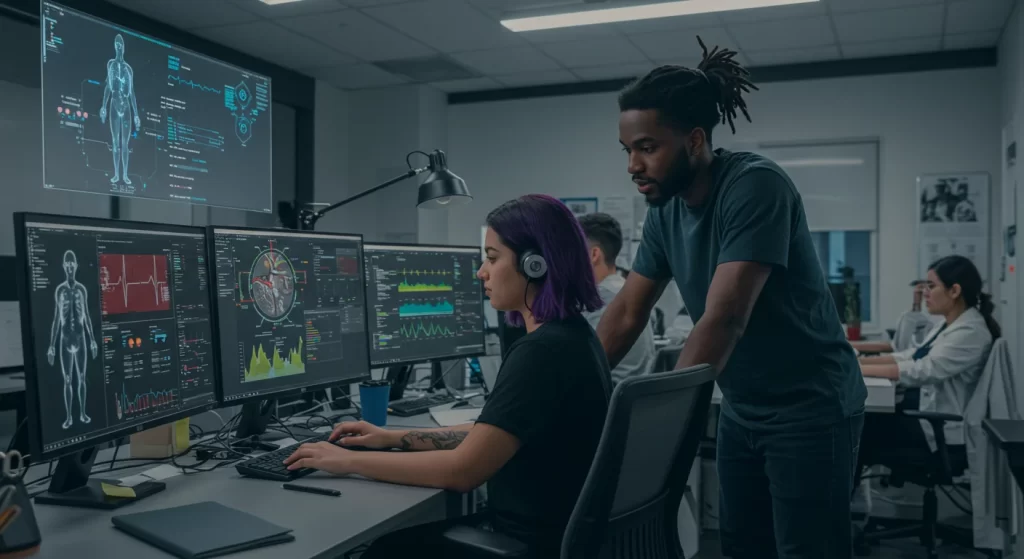The global healthcare landscape faces unprecedented challenges, from aging populations and escalating costs to clinician burnout. Amidst these complexities, Artificial Intelligence (AI) is emerging as a pivotal solution. The AI in healthcare market is forecasted to surge from USD 26.69 billion in 2024 to USD 613.81 billion by 2034. This explosive growth signals a paradigm shift, with healthcare AI startups at the forefront.

Healthcare AI startups are agile, innovation-driven enterprises using AI to address specific healthcare pain points. They disrupt outdated practices and enable enhanced efficiency and improved patient outcomes. These startups are unlocking personalized medicine, accelerating breakthroughs in areas like drug discovery, and democratizing access to quality care.
This article explores the dynamic world of AI startups in healthcare. We will examine market dynamics, key applications including conversational AI in healthcare startups, spotlight innovators, discuss challenges, and glimpse the future. The proliferation of healthcare AI startups stems from mature AI algorithms, vast health data availability (EHRs, medical imaging, genomics, wearables), and pressing healthcare needs. Startups’ agility allows them to tackle niche problems and iterate solutions faster than larger organizations, making them crucial drivers of this AI-powered revolution.
Are you looking to leverage the power of AI in your healthcare solutions? SPsoft has extensive expertise in developing and integrating healthcare AI agents!
Understanding Healthcare AI Startups
Healthcare AI startups are companies where AI-powered solutions for healthcare form their core business model. Unlike organizations using AI as an ancillary tool, for these startups, AI is the primary engine. Their aim is to enhance efficiency, improve patient outcomes, and devise novel solutions to systemic challenges.
The current surge in AI in healthcare startups is due to several converging factors:
- Technological Maturity. Advancements in AI (machine learning, NLP, computer vision, deep learning) provide sophisticated tools for complex healthcare problems.
- Data Abundance. Widespread health information digitization offers critical data (EHRs, medical images, genomic datasets, wearable data) for training AI models.
- Pressing Healthcare Needs. Escalating costs, aging populations, clinical workforce shortages, and demand for personalized care create a fertile environment for AI solutions.
- Investment Influx. Increased investor confidence in AI’s potential to revolutionize healthcare is channeling substantial capital into AI startups in healthcare.
The unique value proposition of these startups lies in their agility, speed, niche focus, specialization, and capacity for disruptive innovation. They can iterate rapidly, concentrate on specific underserved problems, and challenge conventional healthcare paradigms.
The success of healthcare AI startups is linked to their ability to process and interpret vast datasets. AI algorithms, especially machine learning and deep learning, are data-hungry; their performance is proportional to data quality and volume. Healthcare is data-rich, offering inputs from clinical notes to genomic sequences. Startups are developing tools to mine this data for applications like enhanced diagnostics and accelerated drug discovery. The ability to derive clinically meaningful insights from complex data is a key differentiator for successful AI in healthcare startups.
The Booming Market: Healthcare AI Startups by the Numbers
The AI in healthcare sector is experiencing unprecedented expansion. Market valuations and investment figures clearly show a domain undergoing explosive growth, highlighting the transformative potential of AI in healthcare.
Global Market Size and Projected Growth:
The global AI in healthcare market was valued at USD 26.69 billion in 2024. Projections indicate a dramatic rise to approximately USD 613.81 billion by 2034, with a compound annual growth rate (CAGR) of 36.83% between 2025 and 2034. This robust growth underscores the market opportunity for healthcare AI startups.
North America currently commands the largest market share, valued at USD 12.01 billion in 2024. The United States market, a major component, was USD 8.41 billion in 2024 and is anticipated to reach USD 195.01 billion by 2034 (36.94% CAGR). While North America leads, the Asia Pacific region is the fastest-growing market, driven by government investments in smart hospitals, advanced healthcare IT, and growing patient volumes.
Table 1. AI in Healthcare Market Growth Projections
| Region | Market Size 2024/2025 | Projected Market Size 2034 | CAGR (2025-2034) |
|---|---|---|---|
| Global | USD 26.69 billion (2024) / USD 36.96 billion (2025) | USD 613.81 billion | 36.83% |
| North America | USD 12.01 billion (2024) | Significant Share | 36.86% |
| U.S. | USD 8.41 billion (2024) / USD 11.59 billion (2025, approx.) | USD 195.01 billion | 36.94% |
| Asia Pacific | Fastest Growing Market | Significant Growth | High |
| Europe | Significant Market Presence | Significant Growth | High |
Investment Landscape: VC Funding Surge and Investor Focus:
Venture capital (VC) investment in AI startups in healthcare surged to $10.5 billion across 511 deals by Q3 2024, surpassing the 2023 total. Even as overall digital health dealmaking declined, AI-focused companies secured a record 42% of all digital health funding in 2024. The median digital health deal size rose by 39% YoY to a record $5.3 million in 2024, indicating investors are concentrating capital on companies with strong clinical validation and commercial traction. Mega-rounds (deals ≥$100 million) rebounded, particularly for drug discovery startups, with U.S. companies dominating. This selective investment means early-stage healthcare AI startups need a compelling case to attract funding.
The Generative AI Surge within Healthcare:
Generative AI is experiencing its own rapid rise. The global generative AI market was valued at $44.89 billion (Statista) and could become a $1.3 trillion market by 2032 (Bloomberg Intelligence). Within healthcare, the generative AI market was $1.07 billion in 2022 and is forecasted to exceed $21.74 billion by 2032 (35.14% CAGR). This is driven by its potential to improve operational efficiencies (cited by 92% of healthcare leaders) and enable quicker decision-making (65% of leaders). About 75% of leading healthcare companies are experimenting with or plan to scale Gen AI. Startups specializing in GenAI for healthcare are likely to see intense investor interest.
How AI Startups Reshape Healthcare: Key Application Areas
AI startups in healthcare are innovating across a diverse spectrum, fundamentally altering disease diagnosis, treatment development, administrative management, and patient engagement.

Enhancing Diagnostics & Early Disease Detection
A major impact area for AI in healthcare startups is revolutionizing diagnostics and enabling earlier disease detection.
- AI in Medical Imaging (Radiology, Pathology). Deep learning algorithms, like Convolutional Neural Networks (CNNs), analyze medical images (X-rays, CT scans, MRIs, pathology slides) to identify subtle disease indicators, often augmenting human expertise. For instance, AI-driven colonoscopy screenings may reduce polyp miss rates by up to 50%. Startups like PathAI develop AI-powered software for pathology, aiming to improve diagnostic accuracy. Aidoc provides an “AI operating system” (aiOS™) analyzing images across specialties to flag acute abnormalities. Viz.ai specializes in AI-powered care coordination for time-sensitive conditions like stroke.
- Predictive Analytics for Disease Risk. Machine learning models analyze patient data (genetics, lifestyle, clinical history) to predict risks for conditions like cancer and diabetes, enabling proactive interventions.
- Early Cancer Detection. Startups like Freenome use multiomics platforms combining AI with blood test analysis for early cancer detection, focusing on colorectal cancer (CRC). Their PREEMPT CRC study showed promising results. Other innovators include CancerIQ (genetic risk assessment) and AI Medical Service Inc. (gastrointestinal cancers).
Accelerating Drug Discovery & Development
AI startups in healthcare are introducing tools to streamline the long, expensive, and risky drug discovery process.
- Identifying Novel Targets and Candidates. AI algorithms sift through vast biological and chemical datasets to identify potential drug targets and novel candidates more efficiently. Companies like Enveda Biosciences and Basecamp Research apply AI to discover new medicines from natural sources.
- Streamlining Clinical Trials. AI optimizes clinical trial design, predicts patient responses, improves recruitment, and anticipates adverse events.
- Generative AI’s Role. Generative AI is significant in drug discovery. Insitro’s Pharma.AI platform uses generative AI to narrow down drug candidates. The generative AI in drug discovery market is projected to reach $1.4 billion by 2032. Notable startups include Insitro, Generate:Biomedicines (generative biology for protein therapies), and Tempus (AI-driven platform integrating real-world data for oncology).
Powering Personalized Medicine & Treatment Planning
AI is key to shifting from one-size-fits-all medicine to personalized strategies. AI startups in healthcare develop solutions tailoring interventions to each patient.
- Tailoring Treatments. AI analyzes individual patient data (genomic profiles, medical history, lifestyle, wearable data) to create customized treatment plans.
- AI in Genomics. Startups leverage AI to accelerate genetic medicine development and create personalized treatments based on genetic makeup. Examples include Latent Labs (synthetic proteins) and SOPHiA GENETICS (data-driven medicine platform).
- AI in Oncology. AI assists in risk stratification, selecting personalized cancer drugs (e.g., Cure Match), and predicting treatment response. Tempus integrates AI with multimodal data for precision oncology.
- AI in Cardiology. AI enhances cardiac care through improved diagnostics, risk prediction, and patient monitoring. Empallo uses AI for virtual cardiology care.
- AI in Mental Health. AI-driven tools offer virtual support, therapy, diagnostic aid, and personalized treatment plans. Spring Health and Lyra Health use AI for therapist matching, while Woebot offers an AI chatbot for mental health support.
Optimizing Operations & Automating Administrative Tasks
AI startups in healthcare tackle operational inefficiencies and administrative burdens.
- Reducing Clinician Burnout & Improving Workflow. AI automates routine tasks (scheduling, billing, documentation), freeing clinicians for patient care, potentially increasing productivity by up to 40% and reducing operational costs by nearly 30%.
- Revenue Cycle Management (RCM). AI enhances RCM efficiency by monitoring communications, identifying payment patterns, and improving billing accuracy.
- AI in Primary Care. AI tools support clerical tasks and clinical decisions in primary care. Startups like Innovaccer provide AI-powered healthcare data platforms for care coordination and patient management.
Revolutionizing Patient Engagement with Conversational AI
A dynamic niche is conversational AI in healthcare startups, developing AI systems (chatbots, virtual assistants) for natural language interactions. These startups use Natural Language Processing (NLP) and Machine Learning (ML) to understand user intent and improve responses.
Key use cases for conversational AI in healthcare startups include:
- Patient Assistance & Support. 24/7 virtual health assistants for FAQs, symptom guidance, and service navigation.
- Appointment Scheduling. Automated booking and reminders (e.g., Mayo Clinic).
- Symptom Checking & Triage. AI chatbots guide patients on symptoms and next steps (e.g., HealthTap, Ada).
- Medication Reminders & Management. Personalized reminders for medication adherence (e.g., Medisafe).
- Mental Health Support. AI chatbots offer counseling and emotional support (e.g., Woebot).
Conversational AI improves patient access, reduces administrative workload, enhances engagement, and betters treatment adherence. Examples include Phreesia’s chatbot for data collection and Noom’s AI chatbot for weight loss coaching.
AI is largely positioned to augment, not replace, human clinicians, handling data-intensive tasks and freeing professionals for complex decision-making and empathetic care. Advanced AI startups in healthcare increasingly use multi-modal data, integrating information from various sources (imaging, genomics, EHRs) for more holistic analysis, as seen with Tempus and PathAI.
Spotlight on Leading Healthcare AI Startups
The landscape of healthcare AI startups is vibrant. Examining leaders illustrates AI’s application to real-world challenges.
- Freenome. Focuses on early cancer detection (especially colorectal cancer) using AI, multiomics, and blood sample analysis. Raised $1.4 billion; its PREEMPT CRC trial showed promising results.
- PathAI. Advances AI-powered pathology to improve disease diagnosis and support drug development. Its AISight platform has FDA clearance.
- Viz.ai. Uses AI for accelerated care coordination for life-threatening diseases like stroke and hypertrophic cardiomyopathy, analyzing medical images and clinical data. Has multiple FDA clearances.
- Tempus. A publicly traded company advancing precision medicine in oncology using AI to analyze clinical and molecular data. Its Tempus Loop platform aids target discovery.
- Aidoc. Provides an enterprise AI platform (aiOS™) analyzing medical images to detect acute abnormalities, helping prioritize urgent cases. Claims the largest portfolio of FDA-cleared AI algorithms on one platform.
- Insitro. Applies machine learning to create predictive disease models and transform drug discovery. Its Pharma.AI platform uses generative AI.
Table 2. Notable Healthcare AI Startups
| Startup Name | Primary Focus Area | Key AI Technology Used | Recent Funding/Valuation (if available) |
|---|---|---|---|
| Freenome | Early Cancer Detection (CRC) | AI, Multiomics, Machine Learning, Genomic Science | $1.4B raised; $254M Series F (Feb 2024) |
| PathAI | AI-powered Pathology | Digital Pathology, Machine Learning, AI models | $165M Series C (2021) |
| Viz.ai | AI-powered Care Coordination (Stroke, HCM) | AI, Machine Learning, Image Analysis (CTA, ECG) | |
| Tempus | Precision Medicine (Oncology) | AI, Multimodal Data Analysis (Clinical, Molecular, RWD) | Publicly traded (NASDAQ: TEM) |
| Aidoc | Enterprise AI for Medical Imaging | aiOS™, Deep Learning, Image Analysis | |
| Insitro | ML for Disease Modeling & Drug Discovery | Machine Learning, Generative AI (Pharma.AI) | $643.2M raised |
| Noom | Weight Loss, AI Coaching | AI Chatbot, Food Logging AI | $668.7M raised |
| Spring Health | Mental Health, Patient-Therapist Matching | AI for Data-Driven Matching |
These leading startups highlight the critical importance of clinical validation and navigating regulatory landscapes. FDA clearances (PathAI, Viz.ai, Aidoc) and robust clinical trial data (Freenome’s PREEMPT CRC) are paramount for market success and trust. Founders of healthcare AI startups often possess deep domain expertise, blending medical, scientific, and technological acumen, crucial for developing solutions that address genuine clinical needs.
Navigating the Labyrinth: Challenges for Healthcare AI Startups
Despite immense promise, healthcare AI startups face a challenging environment, including data hurdles, complex regulatory and ethical considerations, integration issues, and the need to build trust.

- Data Hurdles. AI models depend on data, presenting challenges like quality, quantity, and bias. Poor data can lead to inaccurate or biased AI models, perpetuating health inequities. Patient data security and privacy (HIPAA, GDPR compliance) are critical. Interoperability issues and data silos in healthcare systems hinder seamless AI integration.
- Regulatory & Ethical Maze. The healthcare sector is highly regulated. AI solutions often require FDA approval, a lengthy and complex process. Evolving AI regulations create uncertainty. Algorithmic bias is a major ethical concern; if AI tools are trained on unrepresentative data, they may perform less accurately for certain groups. The “black box” problem — lack of transparency in AI decision-making — can hinder adoption. Determining accountability for AI errors is also complex.
- Integration & Scalability. AI solutions must integrate seamlessly into clinical workflows without disruption. The cost of AI implementation can be substantial. Solutions must also scale effectively with increasing data and users.
- Building Trust. Overcoming skepticism from clinicians (regarding job replacement, accuracy) and patients (regarding lack of human touch, data privacy) is crucial. Education, transparency, and demonstrating AI’s value as an augmentation tool are key.
These challenges are interconnected. Poor data quality can lead to biased algorithms, eroding trust and complicating regulatory approval. Addressing the “human element” by prioritizing user-centric design, transparency, and engagement is vital for the success of AI in healthcare startups.
The Future Horizon: What’s Next for AI in Healthcare Startups?
The trajectory of AI in healthcare startups points towards an increasingly sophisticated and integrated future, where AI becomes indispensable.

Emerging Trends:
- Hyper-Personalization. AI will drive highly individualized prevention and treatment strategies using multi-modal data (genomics, wearables, lifestyle).
- Predictive Analytics for Proactive Care. AI tools identifying high-risk individuals before symptoms manifest will enable timely, cost-effective interventions.
- AI-Enhanced Medical Imaging as Standard. AI for interpreting medical images will become standard in diagnostic workflows.
- Emotionally Intelligent Virtual Health Assistants. Conversational AI in healthcare startups will develop more nuanced and empathetic virtual assistants, especially for mental health and chronic disease management.
- Ambient Clinical Intelligence. AI-powered tools passively capturing patient-clinician conversations to automate EHR documentation will reduce administrative burdens.
The need for robust ethical frameworks and global collaboration (e.g., WHO initiatives) will grow. Predictions for the next 5-10 years include more AI-discovered drugs reaching patients, seamless integration of wearable data with clinical systems, and increased AI adoption for operational efficiency. AI regulation will continue to evolve, balancing innovation with safety and ethics.
This evolution signifies a shift towards proactive, predictive, and personalized health. AI startups in healthcare delivering on this promise will lead this transformation. AI governance will mature, with formalized protocols at organizational and regulatory levels, making ethical design a fundamental requirement for startups.
Conclusion
The journey of healthcare AI startups showcases AI’s transformative potential. These agile innovators are driving a paradigm shift in diagnostics, drug discovery, personalized treatment, administrative operations, and patient engagement, with conversational AI in healthcare startups notably redefining accessibility.
Opportunities are immense, with a market poised for exponential growth. However, AI startups in healthcare must navigate data hurdles, regulatory complexities, ethical considerations, and integration challenges, all while building trust. Success requires a collaborative ecosystem involving startups, providers, pharmaceutical companies, academic institutions, regulators, and patients. Software development companies like SPsoft can be vital technology enablers.
The future of health is intertwined with AI. By embracing this AI-driven future thoughtfully and ethically, the global community can unlock unprecedented improvements in patient care, accelerate medical breakthroughs, and build a more efficient, equitable, and accessible healthcare system.
Ready to integrate AI into your healthcare operations? SPsoft offers a variety of high-quality services to build and deploy innovative AI solutions! Contact us today!
FAQ
What exactly is a healthcare AI startup?
A healthcare AI startup is a company whose primary business revolves around developing and applying artificial intelligence technologies — such as machine learning (ML), natural language processing (NLP), and computer vision — to create solutions for specific problems within the healthcare sector. Their core mission is typically to improve patient outcomes, enhance operational efficiency in healthcare organizations, or increase access to medical services.
What are the main areas AI startups are focusing on in healthcare?
AI startups in healthcare are active across a broad range of applications. Key areas include diagnostics (especially medical imaging), drug discovery, personalized medicine, operational automation, remote patient monitoring, and patient engagement through conversational AI.
How is conversational AI in healthcare startups different or significant?
Conversational AI in healthcare startups are significant because they create AI systems (like chatbots and virtual assistants) that interact with patients and providers using natural language. They leverage NLP and ML to understand queries, provide information, schedule appointments, offer medication reminders, and deliver mental health support, enhancing accessibility and reducing staff workload.
What is the current market size and growth projection for AI in healthcare startups?
The broader AI in healthcare market, significantly driven by these startups, was valued at USD 26.69 billion in 2024 and is projected to reach USD 613.81 billion by 2034, with a CAGR of about 36.83%.
What are the biggest challenges for AI startups in healthcare?
Major challenges include data-related issues (quality, security, privacy, interoperability), regulatory hurdles (FDA approvals), ethical concerns (algorithmic bias, transparency, accountability), integration with existing systems, scalability, and building trust with clinicians and patients.
How is AI helping in drug discovery and development?
AI accelerates drug discovery by analyzing massive datasets to identify novel targets and compounds, predicting molecular interactions, designing new drug molecules using generative AI, and optimizing clinical trial design.
Are there ethical concerns with using AI in healthcare?
Yes, significant ethical concerns include algorithmic bias leading to inequitable care, patient data privacy, lack of transparency in AI decision-making (“black box” problem), accountability for AI errors, and the potential impact on the patient-provider relationship.
How can one invest in healthcare AI startups?
Investment can occur through Venture Capital (VC) firms specializing in health-tech, angel investing, equity crowdfunding platforms, corporate venture arms of large healthcare/tech companies, or public markets (investing in publicly traded AI-focused healthcare companies). Thorough due diligence is crucial.
What does the FDA approval process generally look like for AI medical devices developed by startups?
The FDA process for AI medical devices (Software as a Medical Device – SaMD) involves device classification based on risk, a premarket submission (e.g., 510(k), De Novo, or PMA), robust clinical validation to demonstrate safety and effectiveness, adherence to quality management systems, comprehensive documentation, and post-market surveillance. The FDA has specific guidance for AI/ML-based SaMD.
What is the future outlook for healthcare AI startups?
The outlook is exceptionally promising, with trends towards hyper-personalized medicine, proactive and predictive healthcare, AI-powered diagnostics becoming standard, more sophisticated ambient intelligence and conversational AI in clinical settings, and advancements in generative AI for drug discovery. Success will depend on addressing ethical considerations, data governance, and regulatory navigation.



